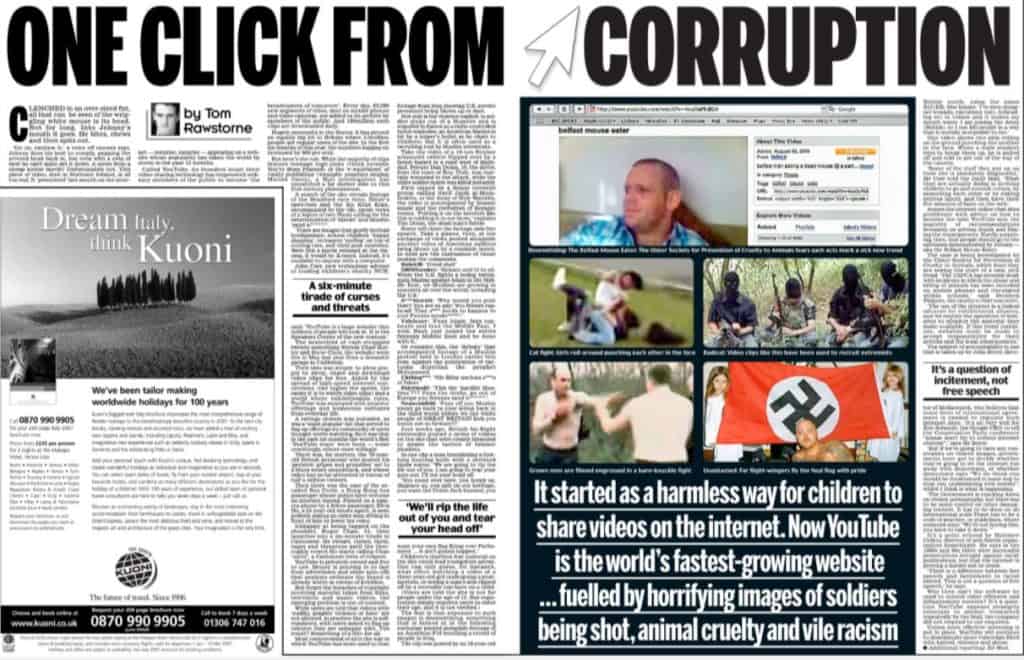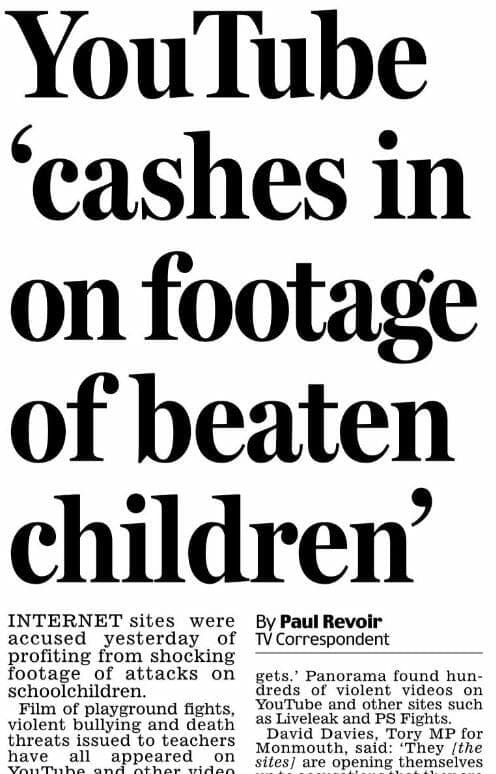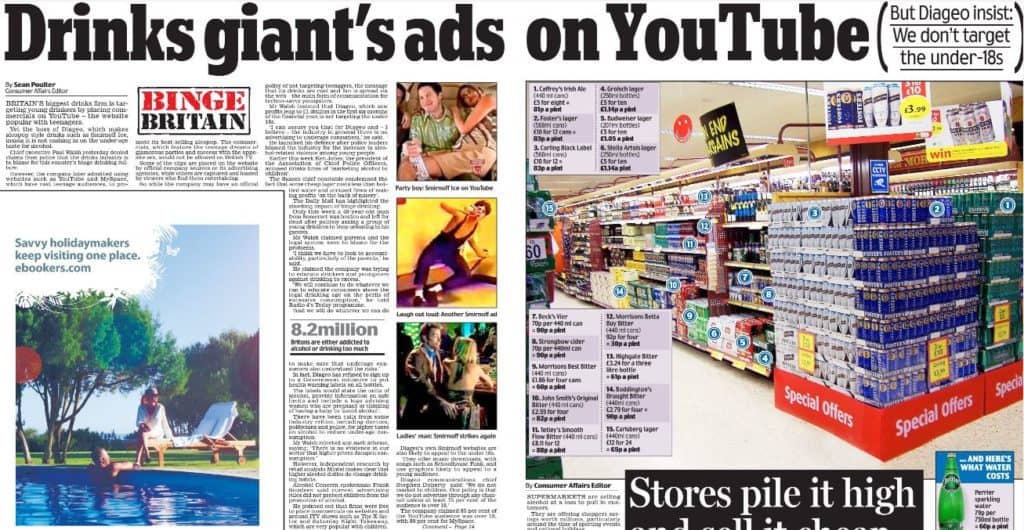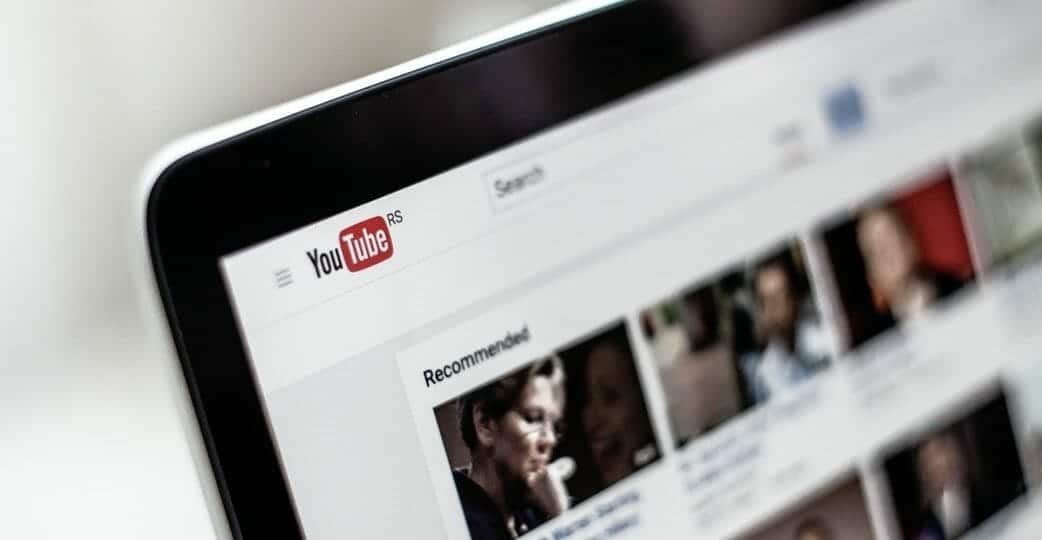│By Kyle Sheldrake, Strategic Marketing Manager – Insights and Development│
Social media and other platforms have greatly increased the ability to spread misinformation and promote division. To many people, demands for platforms such as YouTube and Facebook to take such responsibility may seem relatively new. Many would link it to the rise (or should we say wider public awareness) of “fake news,” hate speech, deliberate misinformation and political bias in the wake of Brexit and questions around Donald Trump’s 2016 election victory.
But is this a recent phenomenon, or has it been an ongoing part of YouTube’s history?
Platform or Publisher?
Historically, companies like YouTube and Facebook have classified themselves as “platforms” rather than “publishers,” a distinction that has allowed them to put the responsibility for posting and flagging inappropriate content on to their users: the platforms are just a digital billboard, it is not up to them to judge what is posted on it. If individuals or groups with agendas successfully use them to manipulate or misinform, that is the fault of the users for not adequately policing it themselves.
The Dark Side of YouTube
That quote, from the Daily Mail Historical Archive, is not from 2020, or from 2016. It is from 2006.
Calls for such “platforms” to take responsibility are not new; YouTube has been facing criticisms for most of its lifespan. The initial sale to Google raised questions about the future integrity of YouTube, and whether they would follow the practice of local censorship in China which Google had been criticised for. Alongside legal questions around copyright issues and intellectual property arguments, the Daily Mail had already uncovered an extremely dark side to YouTube. By the end of 2006 there were already recruitment videos from extremist groups, footage of soldiers being killed in combat, recordings of graphic animal cruelty and child autopsies; often supplemented by comments sections full of openly racist and nationalistic abuse.

Calls to Monitor Content
Multiple organisations have called for YouTube to monitor content: Mediawatch criticised the government for accepting Google’s argument that the internet should be a democracy while YouTube was being used to “undermine civil society”; the Ulster Society for the Prevention of Cruelty to Animals (USPCA) criticised the platform for allowing itself to be a home for “exhibitionist abusers”; Matthew Collins, then director of anti-fascist group Searchlight, did not agree with the argument based around free speech, pointing out that “there is a difference between free speech and incitement to racial hatred,” calling out the lack of action toward YouTube in comparison to the previous success prosecuting racist publications (to note again why the distinction between platform and publisher is so important).
Filtering and control of content was needed to prevent gangs posting recruitment videos and escalating inter-gang violence; YouTube’s response to a Panorama investigation showing footage of severe assaults among teenagers was:
“Actively policing and pre-screening is someone else’s censorship and we do not think that is our role. We believe it is the job of the police to come to us when crimes are committed, and we will comply with their requests to and help them with their requests. It is up to the police to take action when a criminal assault has taken place. We are very happy to help them do that but the balance of responsibility is with the police”.

Shockingly, for several years people could watch violence and hate crimes freely but could not watch discussions from a democratically elected House of Commons. It was only in 2009 that, as part of his reform package to appease voters, David Cameron proposed lifting the ban on UK government proceedings being shown on YouTube.
YouTube and Advertisement
Even advertisers appeared to take advantage of YouTube’s refusal to moderate content. Despite these platforms claiming to offer highly targeted digital advertising that could avoid inappropriate placement, in 2008 Diageo were accused of advertising alcohol products to underage drinkers, which they denied, though the public were happy to point out the flaws in the denial. The problem didn’t go away, as the alcohol industry was called out again in 2011. And again in 2014, this time encouraging irresponsible drinking behaviour.

Advertising junk food to kids when there is a 30% child obesity rate in 2015? YouTube was not covered by Ofcom regulations that applied to television, so companies could promote junk food without restriction. Coupled with the use of programmatic advertising’s random allocation of adverts outside of either’s control, both platform and advertiser had a ready-made defence.
These people and groups can use the platform to spread their philosophies beyond the reach of other media who are subject to stricter regulation, and actively take advantage of loopholes to place their messages in front of bigger and more manipulatable audiences, adopting tactics that have been used by advertisers for years. The reality is fake news, hate speech, and other features of the past few years are not a recent phenomenon, but just the latest iteration of people and groups taking advantage of platforms to spread their ideas and messages beyond more regulated media.
All the articles used in this blog post are from the Daily Mail Historical Archive add-on module (2005-2016). For further information about this add-on module, please visit the archive webpage.
If you’d like to read more posts which made use of the Daily Mail Historical Archive, click here. Or for more about Gale Historical Newspapers, check out From Rise to Red Top: The Role of the Mirror in Shaping British Journalism or The Ultimate Showman: Freddie Mercury’s untold relationship with the UK press.
Blog post cover image citation: Image by NordWood Themes @nordwood on Unsplash https://unsplash.com/photos/8LfE0Lywyak


